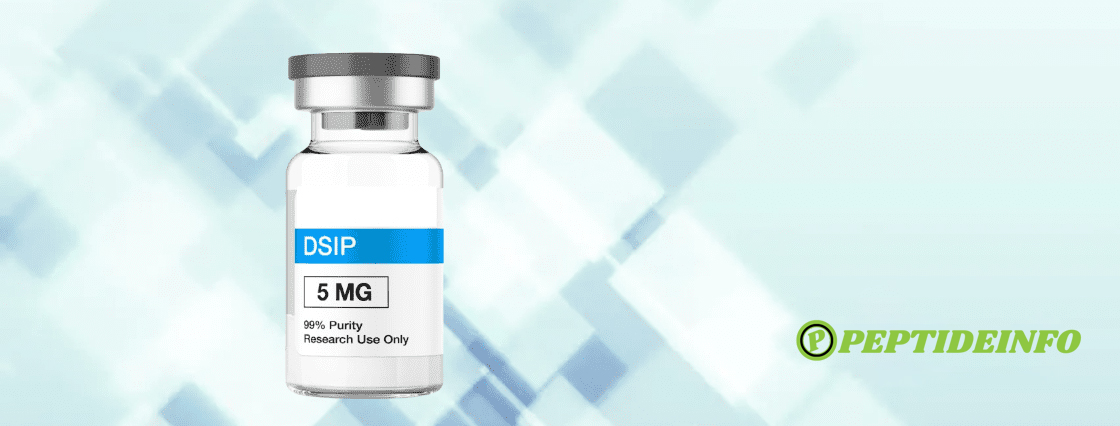The Best Peptide For Sleep | DSIP
Delta sleep-inducing peptide (DSIP) is an endogenously-produced peptide isolated from test animals following stimulation of specific brain regions.
DSIP promotes delta sleep, also known as slow-wave sleep (SWS), which is characterized by delta activity in EEGs and facilitates physical recovery.
The peptide has also been reported to benefit rapid eye movement (REM) sleep and facilitates memory processing. Thus, DSIP may help increase sleep quality and promote more restorative sleep.
Clinically, DSIP has shown promise in normalizing sleep patterns, managing narcolepsy, and even treating addiction withdrawal symptoms [1, 2, 3, 4, 5].

What Are Peptides?
Peptides are small proteins, meaning that they are composed of amino acid building blocks that are linked by peptide bonds, but they are fairly small in size. Generally, the term “peptide” refers to a protein that consists of just one polypeptide chain no longer than 40 or 50 residues.
The primary structure of a peptide usually is linear, but it also may be cyclic (following translation of the amino acid sequence, the N terminus and C terminus have connected via an amide bond) or branched (due to presence of residues with amino groups or carboxyl groups in their R chains) [6].
Whatever the composition of the peptide, the biological properties depend on its amino acid sequence. As in the case of larger proteins, peptides can form secondary structures, such as an alpha helix, and they can have a tertiary structure. Since a peptide is single-chained, however, by definition it cannot have a quaternary structure [7].
Peptides play crucial roles in the human body, including but not limited to [6]:
- Hormone production
- Tissue growth
- Immune responses
- Cell communication
- Healing processes
Due to their immense potential, researchers have successfully explored the therapeutic application of lab-made analogs. As a result, scientists have developed numerous peptide-based medications with high receptor specificity, great pharmacokinetics, and favorable safety profiles [8].
Regulatory authorities have approved over 60 peptide-based drugs for human use, and many more are under active investigation [9]
How Do Peptides Work For Sleep?
Peptides for sleep can work via two main mechanisms:
- Stimulating the release of the sleep hormone melatonin, which is important for sleep onset and quality.
- Interacting with sleep phases, particularly boosting stage-3, aka deep sleep, which is essential for memory consolidation and tissue recovery during sleep.
For example, DSIP has been shown to reduce sleep latency and increase the time spent in stage-3 sleep, aka SWS, in test animals. This is the deepest phase of non-rapid eye movement (NREM) sleep [10].
SWS is associated with recovery and growth, as processes such as growth hormone release and tissue regeneration are most active during this period [11, 12]. During delta wave sleep, some forms of memory consolidation (particularly declarative memory, or memory for facts and events) are thought to occur [13].
According to Korkushko et al. (2014), peptides such as the bioregulator epithalon (AEDG peptide) may help reduce sleep latency and normalize the sleep-wake cycle by boosting melatonin production [14].
Melatonin is a hormone produced by the pineal gland in the brain of humans. It plays a crucial role in regulating sleep-wake cycles. The production of melatonin increases in the evening, promoting sleepiness, and decreases in the morning, helping one to wake up [15].
Thus, it is often referred to as the “sleep hormone.” Additionally, melatonin has antioxidant properties and modulates other physiological functions, such as blood pressure and body temperature [3, 4].
Does Peptide Therapy for Sleep *Actually* Work?
Clinical studies also support the effectiveness of peptides for sleep in humans. Here are some of the most notable clinical trials showcasing the sleep-related benefits of select peptides:
- The Korkushko et al. study on epithalon’s effects in test animals also included a clinical component that involved 12 volunteers taking the peptide and 8 volunteers given placebo. The trial reported that epithalon increased midnight melatonin levels by 145% compared to pre-treatment serum melatonin. Yet, there was no statistically significant difference between melatonin levels before and after placebo administration [14].
- A study on DSIP’s effects on sleep involved six middle-aged participants with frequent sleep disturbances. Over five nights, they underwent sleep recordings, starting with two placebo adaptation nights followed by randomized DSIP or placebo treatments. DSIP tended to decrease awakenings, enhance sleep efficiency, reduce light sleep stages, and possibly increase REM sleep. No side effects were observed, and daytime alertness was consistent [4].
- A 35-year-old male narcoleptic received repeated injections of delta sleep-inducing peptide (DSIP). The effects were assessed through self-reports, performance tests, sleep latency tests, and polysomnography. DSIP decreased sleep attacks, improved daytime alertness, activity, and performance, and compressed the sleep period while enhancing REM sleep [16].
As evident from the aforementioned trials, peptides such as epithalon and DSIP have been shown to improve various sleep-related parameters in clinical settings.
Keep reading to learn more about these research compounds’ specific benefits, mechanisms, and side effects.

DSIP | The Best Sleep Peptide
DSIP is a naturally-occurring peptide made of nine amino acids that was first discovered in 1974 by Swiss scientists Guido A. Schoenenberger and Marcel Monnier.
It was isolated from the blood of laboratory animals after electrical stimulation of a part of the brain called the thalamus playing a role in regulating sleep. Subsequently, DSIP was reported to induce delta sleep when infused in rabbits [1].
Delta activity on electroencephalogram (EEG) is typical for certain sleep stages, especially during the SWS phase. Higher delta activity during this phase is considered an indicator of increased sleep quality, according to research [2].
More specifically, delta waves are associated with a reduced perception of external stimuli, which helps facilitate restorative sleep and prevents individuals from waking up easily [2].
In addition, clinical studies have suggested that DSIP may also have beneficial effects on stage-4 sleep, which is also known as REM sleep and the phase when dreaming occurs [3, 4]. REM sleep has been suggested to play an important function in processing and consolidating emotional memory [17].
DSIP is thought to potentially work via the N-methyl-D-aspartate (NMDA) or the alpha 1-adrenergic receptors [18, 19]. Some researchers also suggest it may interact with neurons via the Mitogen-Activated Protein Kinase (MAPK) pathway, which regulates intercellular signaling [15].
As mentioned, DSIP has been clinically studied and shown success as a tool for normalizing sleeping patterns and managing narcolepsy [3, 4]. The peptide is also under investigation for its potential to treat withdrawal symptoms in alcohol and opiate addiction [5, 20, 21].
Buy DSIP from our top-rated vendor…
Other Peptides For Better Sleep
DSIP stands out as one of the most effective peptides for improving sleep, but it is not the only one with notable potential. Here are several alternative research peptides that also support deep and restorative sleep:
-
Epithalon
This bioregulator is a tetrapeptide with a sequence of Ala-Glu-Asp-Gly (AEDG). The sequence is derived from a mix of polypeptides (epithalamin) extracted from the epiphysis. The latter is also known as the pineal gland, which produces melatonin and regulates the sleep-wakefulness cycle.
The peptide is thought to work by enhancing telomerase activity in cells and elongating their telomeres. This may increase longevity of healthy cells, but there are concerns that by increasing the longevity of bad cells the same mechanism could lead to adverse outcomes [32, 33]. The peptide has been clinically tested in Russia, and the research suggests that its anti-aging effect may help promote longevity [22].
In addition, clinical research suggests that epithalon may help improve sleep. For instance, research conducted in Russia in 2007 discovered that epithalon regulated the hormonal circadian rhythm in older individuals and influenced the activity of the pineal gland. The researchers noted that this peptide elevated melatonin levels in the participants, leading to improved regulation of their sleep patterns [14].
-
Sermorelin
This peptide is a growth hormone-releasing hormone (GHRH) fragment that includes the first 29 amino acids of its N-terminus and an amidation at its C-terminus. It’s the smallest amino acid chain retaining its growth hormone-stimulating properties [23].
Used both diagnostically and therapeutically for GH deficiency, sermorelin has proven effective for increasing growth hormone synthesis and providing related benefits. The peptide has been effectively used for stimulating growth in children with short stature.
In addition, sermorelin may help improve sleep quality as it is a GHRH analog. GHRH is considered one of the hormones that stimulate various sleep-regulatory neurons in the brain and increases slow-wave sleep as a result [24].
-
CJC-1295 and Ipamorelin
This is a blend of two distinct growth hormone secretagogues that work via different mechanisms.
CJC-1295 is a tetrasubstituted form of sermorelin that also mimics the function of the growth hormone-releasing hormone (GHRH) but possesses enhanced stability. In addition, it has a drug-affinity complex (DAC) attached, enhancing its half-life to up to 8 days [25, 26].
Similar to sermorelin, CJC-1295 may stimulate slow-wave sleep and improve sleep depth thanks to being a GHRH analog, although the evidence on CJC-1295 sleep-enhancing potential is only anecdotal.
On the other hand, ipamorelin is a growth-hormone secretagogue that activates the receptors of the hunger hormone ghrelin in the pituitary gland. As a result, it stimulates the release of GH from the gland.
As a ghrelin mimetic, ipamorelin may also possess the sleep-promoting effects of the hunger hormone. Clinical research suggests that repetitive intravenous infusion of ghrelin before bedtime increases both growth hormone levels and slow-wave sleep [27].
Thus, by acting as a ghrelin mimetic, ipamorelin may also increase slow-wave sleep to improve overall sleep depth and quality. At this time, however, no direct evidence supports ipamorelin’s potential for sleep improvement.
Peptides Side Effects and Safety
The available research reveals that peptides for sleep have favorable safety profiles, although it is important to note that the level of evidence varies from one peptide to another.
Furthermore, some peptides may have specific side effects, which researchers must note before including in their studies. Here is a comprehensive breakdown:
- DSIP: The available clinical studies regarding the effects of DSIP on sleep do not report any side effects associated with its use [3]. Only one study in 24 individuals, the majority of which were healthy, reported that DSIP can reduce the depth of anesthesia, increase heart rate and even reduce the intensity of delta-waves in these subjects [28]. Thus the peptide should be used prior to or during anesthesia.
- Epithalon: There are not any notable side effects related to epithalon use, as reported by clinical studies with epithalamin, which is a peptide-based medication made of several compounds, including epithalon. Moreover, researchers have reported its favorable safety profile in a 15 year follow-up study [22]. As noted earlier, however, there is a strong rationale for concerns that epithalon’s telomerase activation mechanism could lead to adverse outcomes [32, 33].
- Sermorelin: Most trials do not indicate any adverse reactions associated with sermorelin administration. This is likely because sermorelin cannot result in an excessively high rise in serum GH or IGF-1 concentrations, in contrast to GH therapy [29]. Nevertheless, some studies have noted a heightened likelihood of edema and joint discomfort, which were temporary side effects that correlated with the dosage [30].
- CJC-1295: Some studies have suggested that CJC-1295 may increase the risk of headache, gastrointestinal disturbances, and vasodilation symptoms, including facial flushing, sensations of warmth, and temporarily lowered blood pressure. No instances of these complaints have been classified as severe [25]. It is possible that CJC-1295 may also increase the risk of edema and joint discomfort due to higher water retention, similar to sermorelin.
- Ipamorelin: ipamorelin’s safety has not been tested extensively in clinical settings, and the largest human study so far was a phase-2 trial with 114 subjects that lasted only 7 days. The trial does not report any side effects within this time frame [31]. However, researchers should note that longer trials with ipamorelin may cause side effects typical for ghrelin mimetics, such as water retention and increased appetite [23].

Peptides, Sleep, and More | FAQ
Keep reading to find the answers to some of the most frequent queries about peptides for sleep.
How Do Researchers Induce Delta Sleep?
Delta sleep, characterized by increased delta waves during sleep EEG, is also known as stage-3 or slow-wave sleep. This is the phase of deepest sleep when the majority of regenerative processes occur. Several peptides, such as delta sleep-inducing peptide (DSIP) and various growth hormone-releasing hormone (GHRH) analogs, are considered to stimulate deep sleep and improve overall sleep quality.
What Peptide is Good For Sleep?
DSIP is widely considered the best peptide for sleep, as it has been found to promote both deep sleep (aka slow-wave sleep) and rapid-eye movement (REM) sleep. Improving these phases is associated with better sleep quality, improved tissue regeneration, higher growth hormone release during sleep, and enhanced memory consolidation.
How Does DSIP Peptide Work?
The exact mechanisms behind DSIP’s benefits are yet to be explored, but scientists suggest that the peptide may work by interacting with various receptors in the brain and regulating intracellular signaling. Ultimately, the peptide has been reported to provide benefits for both non-REM and REM sleep, reducing sleep latency, minimizing daytime sleepiness, and improving overall sleep quality.
When Should Researchers Take The DSIP Peptide?
According to the available studies, DSIP is usually applied shortly before sleep onset due to its short half-life of just several minutes.
Does Sermorelin Help Sleep?
Sermorelin may help improve slow-wave sleep due to its ability to activate the growth hormone-releasing hormone (GHRH) receptors. Native GHRH may play a role in sleep regulation, more specifically in promoting slow-wave sleep, which is associated with tissue recovery and regeneration. As a GHRH analog, sermorelin may have similar effects.
Peptides and Sleep | Verdict
Peptides such as DSIP and epithalon have been shown by scientific studies to improve various aspects of sleep physiology, including melatonin production, sleep stages, daytime sleepiness, and overall sleep quality.
Moreover, the available clinical data reveal that these peptides have great safety profiles and are well-tolerated even in long-term studies.
Researcher looking to explore the potential of peptides in sleep physiology should obtain reference materials from a trustworthy online source. This is crucial.
Among the most respected vendors in the scientific community are Life, recognized for their reliability in supplying research peptides.


